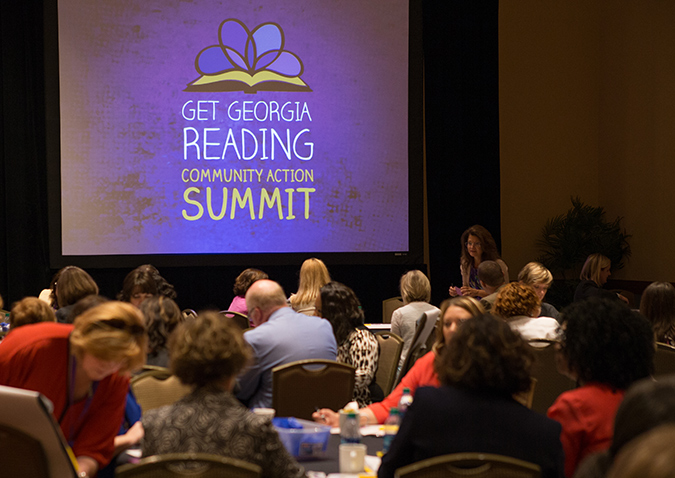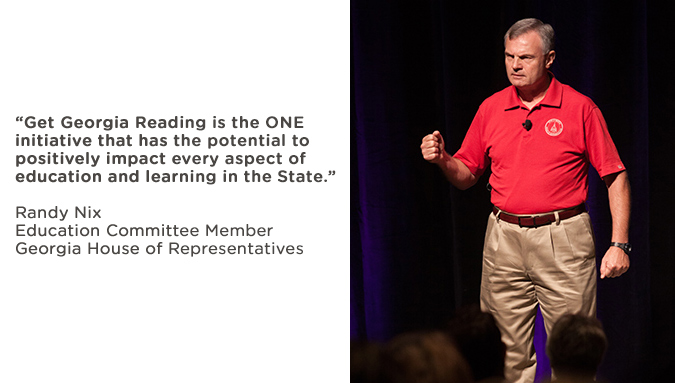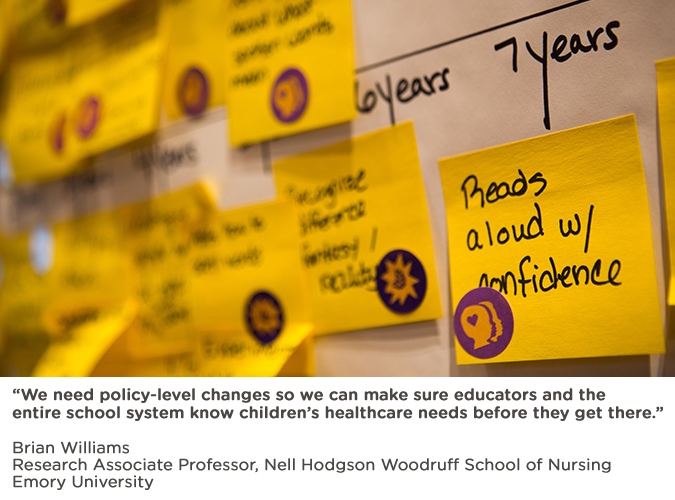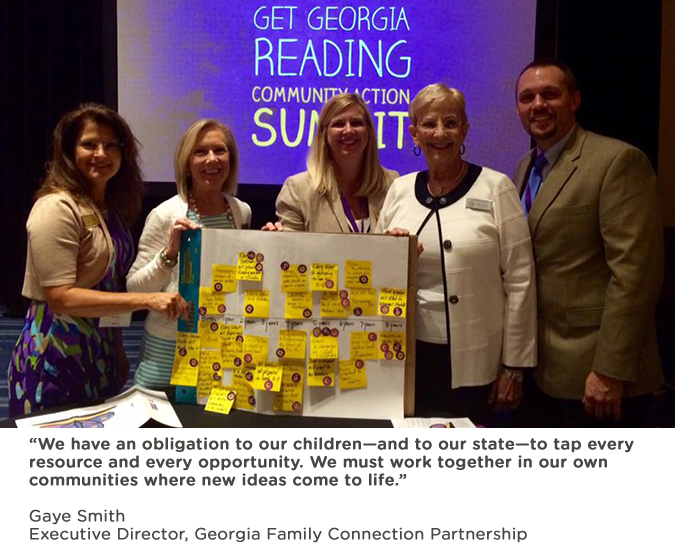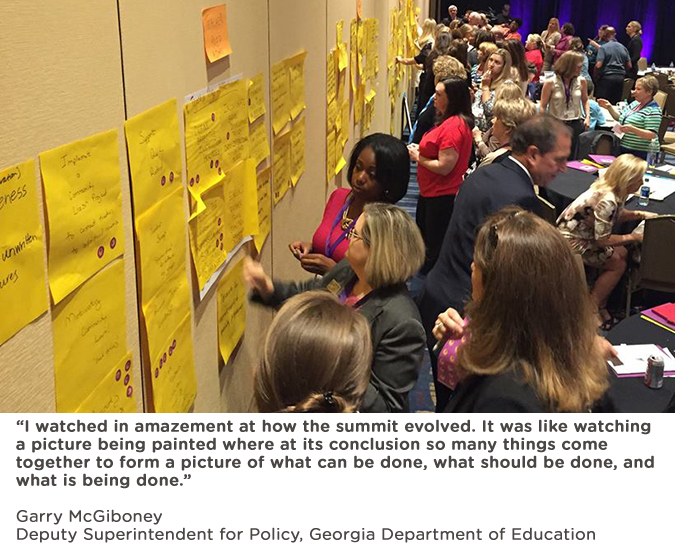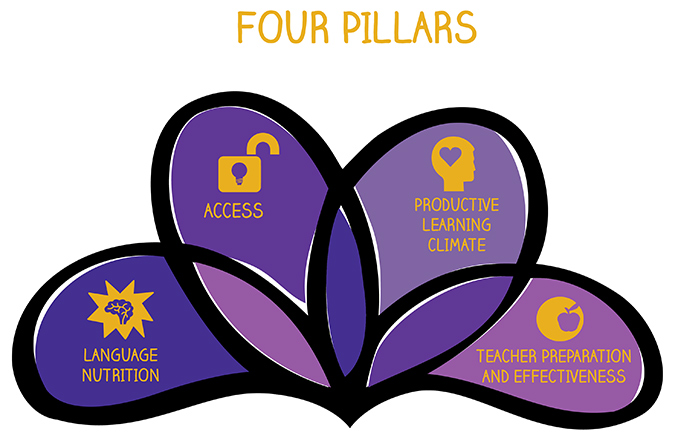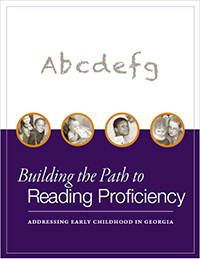Get Georgia Reading Summit Inspires Communities to Take Action
Print This Post|
That’s why state and community leaders, educators, librarians, health and business professionals, juvenile court judges, elected officials, and the first lady of Georgia assembled early this month at the Get Georgia Reading Community Action Summit. They came to Atlanta to honor a commitment to get every child in the state on the path to reading proficiently by third grade by 2020. Members of this unprecedented alliance gained a deeper understanding of the research and best and promising practices around early learning—grade-level reading at the two-day summit, then they rolled up their sleeves to design a plan for applying a common agenda in communities across the state.
Language abilities and literacy development are driven by a complex combination of early-childhood experiences and factors. That is according to Building the Path to Reading Proficiency: Addressing Early Childhood in Georgia, a research compendium that Georgia Family Connection Partnership (GaFCP) released at the summit. Children today can’t read because their bodies and brains lack proper nutrition, and many lack access to health care, quality early care and education, safe and healthy classroom environments, books, summer learning opportunities, and involved adults.
Summit participants received a copy of the compendium and heard from experts before diving deeper into the challenges and opportunities presented by systemic issues like neighborhood and community environment. Access to services, including quality early childhood education, early intervention, physical and mental healthcare; school climate; absenteeism; and teacher preparation all play a role in supporting or hindering healthy brain development, academic success, and the quality of the workforce. “The compendium and the summit will inform community conversations, and help us tactically redesign Georgia’s approach to language and literacy instruction,” said GaFCP Executive Director Gaye Smith. “The Get Georgia Reading Campaign fits right into Family Connection’s sweet spot, because we reach 159 counties, and we understand how health, education, family stability, and ultimately, strong communities intersect.”
“The time is right to prepare leaders across the state to get involved in the Get Georgia Reading Campaign,” said Campaign Director Arianne Weldon. “Getting the tool kit into every community in the state will ensure that all children benefit from the four pillars of the Campaign’s common agenda—Language Nutrition, Access, Positive Learning Climate, and Teacher Preparation and Effectiveness. Until then, we’re confident these leaders will return to their communities equipped to share ideas, take action, and make a difference both individually and by working collectively.”
“We see huge amounts of cost savings from educating children early in quality programs,” said Sally Wallace, chair of the Andrew Young School of Policy Studies and director of the Fiscal Research Center at Georgia State University. “And from a public investment perspective, it’s one of the best places to put public dollars. Put your tax dollars into this industry and the benefits—long term—for the health of kids, parents, and the economy are positive.” |
|
|
GaFCP hopes parents, educators, health professionals, community and business leaders, legislators, and investors will use this compendium in their sphere of influence to make a difference for Georgia’s children, families, and communities. |
|
Lynn Peisner Follow us on Twitter @gafcpnews. |
|
|
Georgia Family Connection Partnership (GaFCP) is a public-private partnership created by the State of Georgia and funders from the private sector to assist communities in addressing the serious challenges facing children and families. GaFCP also serves as a resource to state agencies across Georgia that work to improve the conditions of children and families. GaFCP is the host organization for the Get Georgia Reading Campaign. Visit gafcp.org to learn more. Get Georgia Reading—the Campaign for Grade-Level Reading is a platform for connecting people, agencies, organizations, sectors, disciplines, communities, and regions across Georgia around a common agenda supporting the shared expectation that al children in Georgia will be on a path to third-grade reading proficiency by 2020. Visit getgeorgiareading.org to find out how you can support the Campaign. |
|

